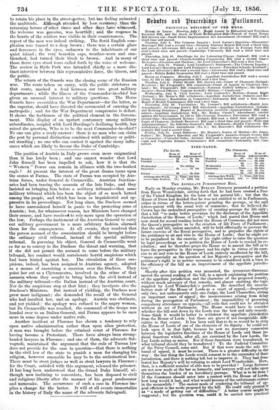The position of Austria in Italy grows even more enigmatical
than it has lately been ; and one cannot wonder that Lord John Russell has been impelled to ask, how it is that the " Western " Power can remain in alliance with the two-beaked eagle ? At present the interest of the great drama turns upon the scenes at Farina. The state of Parma was occupied by Aus- trian forces under General de Crenneville. Austrian function- aries had, been tracing the assassin of the late Duke, and they insisted on bringing him before a military tribunal—that same military tribunal which has been the object of so much hatred among the people, and which has been so inquisitorial and op- pressive in its proceedings. Not long since the Duchess seemed to have surrendered herself in panic to the protecting arms of Austria ; but, for whatsoever reason, her Ministers have changed their course, and have resolve& to rely more upon the operation of the law. Perhaps the incitement of the Austrian General to carry out military government in a more arbitrary fashion alarmed them for the consequences. At all events, they resolved that the person accused of the assassination should be brought before the ordinary civil tribunal, instead of the special military tribmiaL In pursuing his object, General de Crenneville went se far as to convey to the Duchess the threat and warning, that if she did not permit the accused, to come before the military tribunal, her conduct would corroborate horrid suspicions which had been hinted against her. The circulation of these sus- picions, indeed, has been assigned to Austrian agency, adopted as a means of exercising a coercion over the Duchess. They point her out as a Clytemnestra, involved in the crime of that assassin whom they sought to bring before the civil instead of the military tribunal—the Italian instead of the Austrian court. Nor do the suspicions stop at that hint; they inculpate also the Duchess's Ministers. But instead of yielding, the Duchess now grew more indignant; she demanded the recall of the General who had insulted her, and an apology. Austria was obstinate, and yet yielded : the apology was refused to the angry woman, but Be Crenneville was recalled, the command of the troops was handed over to an Italian General, and Parma appears to be once more in some degree under native rule.
Another incident at Florence has shown a tendency to rely upon native administration rather than upon alien protection. A man was brought before the criminal court of Florence. for having become a Protestant. There have always been strong- headed lawyers in Florence ; and one of them the advocate Sal- vagnoli, maintained the argument that the Code of Tuscan law does not provide for the case in question—that there is nothing in the civil law of the state to punish a man for changing his religion, however amenable he may be to the ecclesiastical law. There must be stout judges as well as stout lawyers in Florence ; for the Court, satisfied with this argument, released the prisoner. It has long been understood that the Grand Duke himself, al- though now inclining to concordats, has been disposed to civil and religious liberty after the manner of his great predecessor and namesake. The occurrence of such a ease in Florence im- plies a change for the better. It will at all events immortalize in the history of Italy the name of the advocate Salvagnoli.


























 Previous page
Previous page